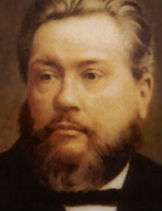Spurgeon on the Spirit
 Charles Haddon Spurgeon (1834-1892) was the great Baptist preacher
of Victorian London. His sermons reflect learning, meditation and
incisive common sense. Here is his message on the Holy Spirit in
1880.
Charles Haddon Spurgeon (1834-1892) was the great Baptist preacher
of Victorian London. His sermons reflect learning, meditation and
incisive common sense. Here is his message on the Holy Spirit in
1880. The Holy Spirit helps us bear the infirmities of our body and of our mind; He helps us to bear our cross, whether it be physical pain, or mental depression or spiritual conflict, or slander, or poverty, or persecution.
We bathe our wound in the lotion of prayer, and the pain is lulled, the fever is removed. Here then, in the nick of time, as a very present help in trouble, comes in the Holy Spirit. He draws near to teach us how to pray, and in this way He helps our infirmity, relieves our suffering, and enables us to bear the heavy burden without fainting under the load.
Now, beloved, it is in such a plight as this that the Holy Spirit aids us with his divine help, and hence he is a “very present help in trouble.”
He instructs us.
He instructs us as to our need and as to the promises of God which refer to that need.
He show us what our necessities are, and then He casts the same light upon the promises of the Word and lays home to the heart that very text which was intended to meet the occasion – the precise promise which was framed with foresight of our present distress.
How greatly we ought to value the Holy Spirit because when our perplexed spirit is so befogged and beclouded that it cannot see its own need, the Spirit of God comes in and teaches us all things, and brings all things to our remembrance.
The Holy Spirit has a wonderful power over renewed hearts, as much power as the skilful minstrel has over the strings among which he lays his accustomed hand.
The influences of the Holy Spirit at times pass through the soul like winds through [David’s harp], creating and inspiring sweet notes of gratitude, to which we should have been strangers if it had not been for his divine visitation.
He can arouse us from our lethargy. He can warm us out of our lukewarmness. He can enable us when we are on our knees to rise above the ordinary routine of prayer into that victorious [attitude] against which nothing can stand.
…and this is all part of that process by which in inspiring our prayers He helps our infirmity.
A true Advocate is He and a Comforter most effective.
Blessed be His name.
(Scripture inspired by the Spirit.)